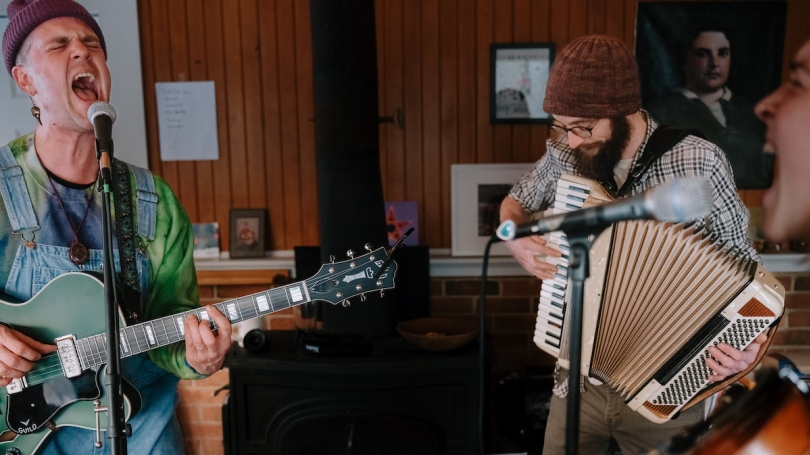
César Alvarez (left) in a recording session with Justing Rodig (Photo by Sarah Priestap Porter)
The award-winning composer and lyricist will perform songs from the album at Joe's Pub in New York City on May 25.

César Alvarez (left) in a recording session with Justing Rodig (Photo by Sarah Priestap Porter)
"As a parent sometimes I feel like a staging area, or work surface, for something other than my own life," César Alvarez wrote on Instagram earlier this year alongside an excerpt of a music video for their new song, Normal, IL . "I'm trying so hard to make a solid ground for these little humans, but it turns me into a kind of human shield. And at the same time, I attempt to de-armor in order to make art with as much vulnerability as I can muster."
The poignant and whimsical video features Alvarez's three young children, with art direction by their partner, visual artist and designer Emily Orling, as they lovingly outline Alvarez's body with swaths of colorful paint.
The song's opening words—which begin Alvarez's newly released album, egg —speak to the mess and heavy responsibility that come with parenting young children: "I'm covered in marks, bites, ticks, scars, stains, torn-up fabric," Alvarez croons. "My pockets are full of receipts and wrappers and remnants of things that I still have to deal with."
Each of the album's 10 tracks create a different sonic texture, weaving Alvarez's voice with saxophones, synthesizers, found sound, and occasionally, the voices of Orling and the children—hinting perhaps at the kaleidoscopic emotional experience of family life. The album represents Alvarez's first solo album and follows several large-scale collaborative musicals, including last summer's Noise (a musical) , which the Hopkins Center for the Arts brought to Northern Stage.
The assistant professor of music, whose accolades include the Jonathan Larson Award, the Kleban Prize for Musical Theatre , and a Guggenheim Fellowship , has been performing the songs live with a band that includes several members of the Dartmouth community—Katie McCabe '21, Eli Hecht '23, and lecturer and composer Bethany Younge —as well as musicians Tristan O'Shea and Justin Rodig.
Alvarez will perform songs from egg at Joe's Pub in New York City on May 25 . An edited Q&A follows.
As a multidisciplinary artist, your work has been deeply collaborative, from indie rock bands to large experimental musicals. What led you to focus on a solo album?
After working on large-cast experimental musicals, performing with a band, and dedicating my songwriting to storytelling for many years, I started to wonder what my music would sound like without any collaborative or formal demands on it. In 2016 I started to work on a solo project in the cracks and odd spaces between my other projects. After coming to Dartmouth during the pandemic and moving to rural Vermont, I found myself finally being able to focus on it.
The album grew into a space for me to process all sorts of questions about family, trans-parenthood, and surviving late capitalism. The working title for the album was "Geology," because with the music I felt like I was studying the elemental composition of my moral framework.
How would you describe the genre of the album?
In the album I was trying to release myself from my own habits and orthodoxies around musical structure. I worked to follow the writing process in whatever circuitous path it wanted to take. The result is an album that is very surreal and nonlinear. It twists through many sonic worlds, strings, winds, synthesizers, and experiments in vocal processing. It's a very unusual series of songs.
How do you think your work in theater influenced the album?
The album is very lyric and story forward, which is the quality of my work that sent me into theater in the first place. When I listen to it now it still feels theatrical, in spite of originally being an escape from theater.
My partner, Emily Orling, and I have been developing a multimedia version of the album that is a piece of theater/performance art. Since the album was made in our home with our kids running around, the music is very connected to our particular kind of domesticity.
You recently described yourself as an "interdimensionalist" —what do you mean by that?
Each of my musicals contains, at its core, a dimensional crossing. Whether that's encountering a nonhuman consciousness, time travel, encountering liminal cracks in spacetime, or just talking to spirits. All of my work deals with how we might cross into other realities and learn from the invisible world. I view music as a vibrational language that allows us to work in the invisible, so interdimensionality is what I work with every day.
What do you hope listeners take away from this music?
There's a lyric on the album, "I sing to heal myself, healing you is a side effect." I really hope that people get some good side effects, but ultimately, I had to make this music for my own sanity and healing. My hope is that it can offer that to others.